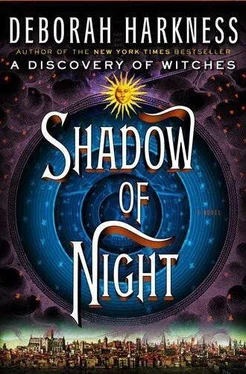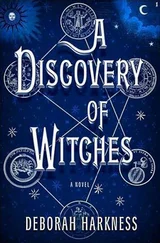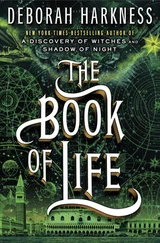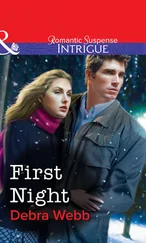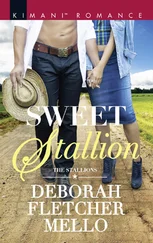The room’s furnishings were spare but well made. A wide settle and two deep chairs waited by the fireplace. The oak table in the center of the room was unusually fine, less than three feet across but quite long, its legs decorated with the delicate faces of caryatids and herms. A beam set with candles hung over the table. It could be raised and lowered by use of the smooth rope-and-pulley system suspended from the ceiling. Carved lions’ heads snarled from the front band of a monstrous cupboard that held a wide array of beakers, pitchers, cups, and goblets—though very few plates, as befitted a vampire household.
Before we settled down to our dinner of roast goose, Matthew showed me our bedroom and his private office. Both were across the entrance hall opposite the parlor. Gabled windows overlooked the courtyard, making both rooms feel light and surprisingly airy. The bedroom had only three pieces of furniture: a four-poster bed with a carved headboard and heavy wooden tester, a tall linen press with paneled sides and door, and a long, low chest under the windows. The last was locked, and Matthew explained that it held his suit of armor and several spare weapons. Henry and Françoise had been in here, too. Ivy crawled up the bedposts, and they’d tied sprigs of holly to the headboard.
Whereas the bedroom looked barely occupied, Matthew’s office was clearly well used. Here there were baskets of paper, bags and tankards full of quills, pots of ink, enough wax to make several dozen candles, balls of twine, and so much waiting mail that my heart sank just thinking about it. A comfortable-looking chair with a sloping back and curved arms sat before a table with extendable leaves. Except for the heavy table legs with their bulbous, cup-shaped carvings, everything was plain and practical.
Though I had blanched at the piles of work that awaited him, Matthew was unconcerned. “It can all wait. Not even spies conduct business on Christmas Eve,” he told me.
Over dinner we talked more about Walter’s latest exploits and the shocking state of traffic in London, and we steered clear of more sober subjects, like Kit’s latest drinking binge and the enterprising William Shakespeare. After the plates were cleared, Matthew pulled a small game table away from the wall. He removed a deck of cards from the compartment under the tabletop and proceeded to teach me how to gamble, Elizabethan style. Henry had just persuaded Matthew and Gallowglass to play flapdragon—an alarming game that involved setting raisins alight in a dish of brandy and betting on who could swallow the greatest number—when the sound of carolers rose from the street outside the windows. They were not all singing in the same key, and those who didn’t know the words were inserting scandalous details about the personal lives of Joseph and Mary.
“Here, milord ,” Pierre said, thrusting a bag of coins at Matthew.
“Do we have cakes?” Matthew asked Françoise.
She looked at him as if he’d lost his mind. “Of course we have cakes. They are in the new food cupboard on the landing, where the smell will not disturb anyone,” Françoise said, pointing in the direction of the stairs. “Last year you gave them wine, but I do not believe they require it tonight.”
“I’ll go with you, Matt,” Henry volunteered. “I like a good song on Christmas Eve.”
The appearance of Matthew and Henry downstairs was marked by a definite uptick in the choir’s volume. When the carolers came to a rather uneven finish, Matthew thanked them and passed out coins. Henry distributed the cakes, which led to many bows and a hushed “Thank you, my lord” as the news passed that this was the Earl of Northumberland. The carolers moved off to another house, following some mysterious order of precedence that they hoped would ensure them the best refreshments and payments.
Soon I could no longer smother my yawns, and Henry and Gallowglass began to gather up their gloves and cloaks. Both were smiling like satisfied matchmakers when they headed for the door. Matthew joined me in bed, holding me until I fell asleep, humming carols and naming the city’s many bells as they sounded the hour.
“There is St. Mary-le-Bow,” he said, listening to the sounds of the city. “And St. Katherine Cree.”
“Is that St. Paul’s?” I asked as a prolonged clarion sounded.
“No. The lightning that took off the steeple destroyed the bells, too,” he said. “That’s St. Saviour’s. We passed it on our way into town.” The rest of London’s churches caught up with Southwark’s cathedral. Finally a straggler finished with a discordant clang, the last sound I heard before sleep overtook me.
In the middle of the night, I was awakened by conversation coming from Matthew’s study. I felt the bed, but he was no longer with me. The leather straps that held up the mattress squeaked and stretched as I jumped to the cold floor. I shivered and threw on a shawl before leaving the room.
Judging by the pools of wax in the shallow candlestands, Matthew had been working for hours. Pierre was with him, standing next to the shelves built into a recess by the fireplace. He looked as though he’d been dragged backward through the Thames mud at low tide.
“I’ve been all over the city with Gallowglass and his Irish friends,” Pierre murmured. “If the Scots know anything more about the schoolmaster, they will not divulge it, milord .”
“What schoolmaster?” I stepped into the room. It was then I spotted the narrow door hidden in the wooden paneling.
“I am sorry, madame . I did not mean to wake you.” Pierre’s dismay showed through the filth, and the stench that accompanied him made my eyes water.
“It’s all right, Pierre. Go. I’ll find you later.” Matthew waited while his servant fled, shoes squelching. Matthew’s eyes drifted to the shadows by the fireplace.
“The room that lies beyond that door wasn’t on your welcome tour,” I pointed out, going to his side. “What’s happened now?”
“More news from Scotland. A jury sentenced a wizard named John Fian—a schoolmaster from Prestonpans—to death. While I was away, Gallowglass tried to find out what truth, if any, lies behind the wild accusations: worshipping Satan, dismembering dead bodies in a graveyard, transforming moles’ feet into pieces of silver so he was never without money, going to sea in a ship with the devil and Agnes Sampson to thwart the king’s policies.” Matthew tossed a paper onto the table in front of him. “So far as I can tell, Fian is one of what we used to call the tempestarii , and nothing more.”
“A windwitch, or possibly a waterwitch,” I said, translating the unfamiliar term.
“Yes,” Matthew agreed with a nod. “Fian augmented his teacher’s salary by causing thunderstorms during dry spells and early thaws when it looked as if the Scottish winter would never end. His fellow villagers adored him, by all accounts. Even Fian’s pupils had nothing but praise. Fian might have been a bit of a seer—he’s credited with foretelling people’s deaths, but that could have been something Kit cooked up to embellish the story for an English audience. He’s obsessed with a witch’s second sight, as you’ll remember.”
“Witches are vulnerable to the shifting moods of our neighbors, Matthew. One minute we’re friends, the next we’re run out of town—or worse.”
“What happened to Fian was definitely worse,” Matthew said grimly.
“I can imagine,” I said with a shudder. If Fian had been tortured as Agnes Sampson had, he must have welcomed death. “What’s in that room?”
Matthew considered telling me that it was a secret but wisely refrained. He stood. “It would be better if I showed you. Stay by me. It’s not yet dawn, and we can’t take a candle into the room for fear that someone will see it from outside. I don’t want you to trip.” I nodded mutely and took his hand.
Читать дальше
